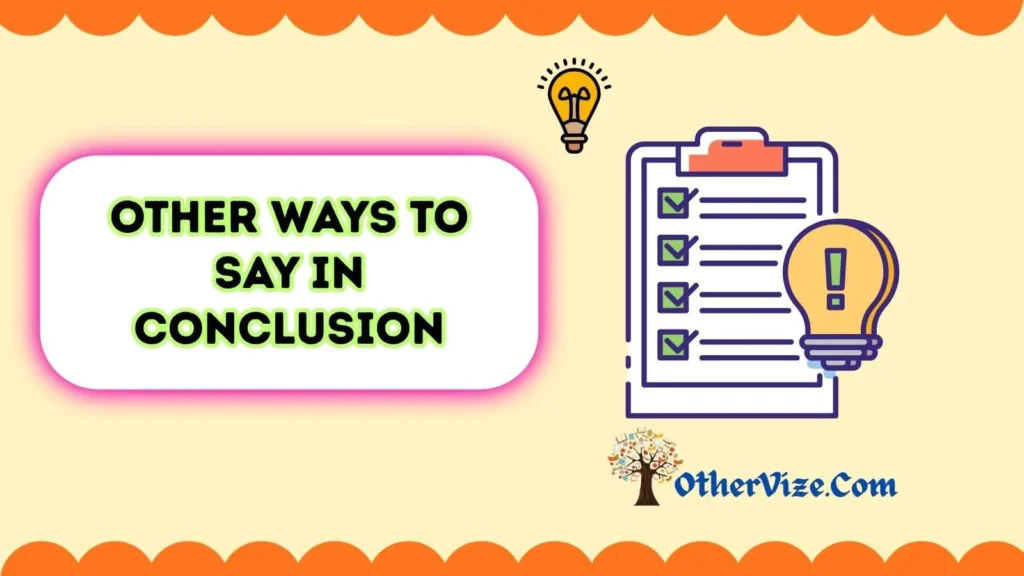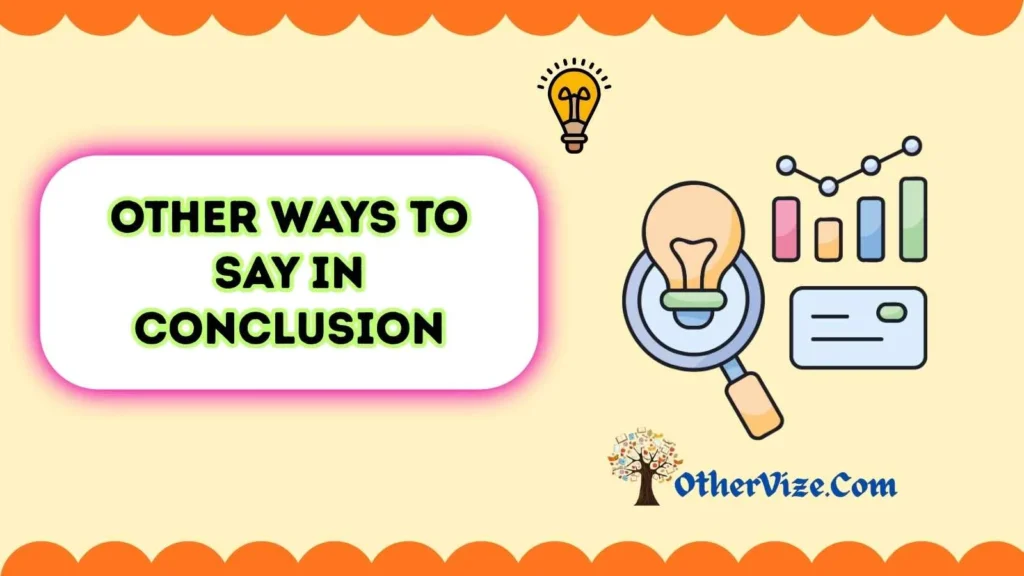Last updated on November 14th, 2025 at 10:11 pm
Wrapping up your thoughts effectively is crucial in both writing and speech.
Whether you’re crafting an essay, a business report, or a persuasive argument, using the same phrase—like “in conclusion”—repeatedly can become dull and predictable.
Instead, varying your language helps keep your audience engaged while maintaining professionalism and clarity.
That’s why we’ve compiled 26 other ways to say “in conclusion” to help you elevate your writing and speech.
These alternatives range from formal to informal expressions, ensuring you have the right phrase for any situation.
Whether you’re summarizing an argument, closing a presentation, or ending an email, these variations will make your final thoughts more impactful.
Below, you’ll find all 26 alternatives in one section, followed by 20 carefully selected variations with definitions, descriptions, and usage examples.
All 26 Alternatives to “In Conclusion”
- To sum up
- In summary
- To wrap things up
- Ultimately
- In closing
- As a final point
- To conclude
- In the end
- As a summary
- All in all
- In a nutshell
- Wrapping up
- At the end of the day
- On a final note
- To finalize
- To bring it all together
- Let’s conclude
- Summing up
- To close things out
- The bottom line is
- Finally
- To put it briefly
- As a closing remark
- Last but not least
- The takeaway is
- As we finish
1. To Sum Up
Definition: A phrase that concisely restates key points.
Description: This alternative works well in both formal and informal writing when summarizing multiple points.
Usage Examples:
- To sum up, our strategy focuses on customer satisfaction and innovation.
- To sum up, the evidence strongly supports this hypothesis.
2. In Summary
Definition: A straightforward way to introduce a brief recap.
Description: Best suited for formal writing, essays, and professional reports.
Usage Examples:
- In summary, the project was a success despite the challenges.
- In summary, our findings indicate a significant improvement in sales.
3. To Wrap Things Up
Definition: A casual way to indicate the conclusion of a discussion.
Description: Suitable for presentations, speeches, or informal writing.
Usage Examples:
- To wrap things up, let’s review the key takeaways from today’s meeting.
- To wrap things up, remember to submit your reports by Friday.
4. Ultimately
Definition: A term that signifies the final and most important conclusion.
Description: Works well in formal writing and academic papers.
Usage Examples:
- Ultimately, our goal is to create a sustainable future.
- Ultimately, the decision lies in the hands of the voters.
5. In Closing
Definition: A refined way to signal the end of a speech or presentation.
Description: Commonly used in formal speeches, emails, and business settings.
Usage Examples:
- In closing, I’d like to thank everyone for their hard work.
- In closing, let’s focus on continuous improvement moving forward.
6. As a Final Point
Definition: A phrase used to emphasize the last major point before ending.
Description: Ideal for academic writing and persuasive arguments.
Usage Examples:
- As a final point, consider the impact of technology on education.
- As a final point, teamwork is essential to success.
7. To Conclude
Definition: A formal way to introduce a conclusion.
Description: Best for research papers, essays, and professional reports.
Usage Examples:
- To conclude, our research highlights key market trends.
- To conclude, the results confirm our initial hypothesis.
8. In the End
Definition: A phrase that signals a final outcome or resolution.
Description: Works well in both casual and formal contexts.
Usage Examples:
- In the end, hard work and persistence lead to success.
- In the end, the company chose to expand internationally.
9. As a Summary
Definition: A direct way to introduce a recap.
Description: Effective for academic writing, reports, and structured presentations.
Usage Examples:
- As a summary, the experiment proved our hypothesis.
- As a summary, the policy changes benefited employees.
10. All in All
Definition: A phrase that provides an overall assessment or conclusion.
Description: Works well in both formal and conversational writing.
Usage Examples:
- All in all, the event was a great success.
- All in all, the changes have been beneficial for everyone.
11. In a Nutshell
Definition: A concise way to summarize key points briefly.
Description: This phrase is informal yet effective for both spoken and written communication.
Usage Examples:
- In a nutshell, our company aims to innovate and inspire.
- In a nutshell, the book explains the importance of mindfulness.
12. Wrapping Up
Definition: A phrase that signals the conclusion of a discussion or presentation.
Description: Often used in casual settings, meetings, and public speaking.
Usage Examples:
- Wrapping up, I’d like to highlight the team’s incredible effort.
- Wrapping up, remember to submit your assignments by the deadline.
13. At the End of the Day
Definition: A conversational way to introduce a concluding thought.
Description: Commonly used in informal discussions and persuasive writing.
Usage Examples:
- At the end of the day, success is about persistence and hard work.
- At the end of the day, customer satisfaction is our top priority.
14. On a Final Note
Definition: A phrase used to introduce the last important point.
Description: Effective in speeches, emails, and presentations.
Usage Examples:
- On a final note, let’s continue striving for excellence.
- On a final note, I appreciate everyone’s dedication to this project.
15. To Finalize
Definition: A structured way to bring a discussion or argument to a close.
Description: Commonly used in reports, meetings, and professional settings.
Usage Examples:
- To finalize, we will implement the new policy next quarter.
- To finalize, let’s ensure all details are double-checked.
16. To Bring It All Together
Definition: A phrase that connects all discussed points into a unified conclusion.
Description: Suitable for academic papers and formal writing.
Usage Examples:
- To bring it all together, our research confirms the hypothesis.
- To bring it all together, teamwork remains the key to success.
17. Let’s Conclude
Definition: A simple and direct way to signal the end of a discussion.
Description: Works well in speeches, meetings, and presentations.
Usage Examples:
- Let’s conclude by reviewing the next steps for our project.
- Let’s conclude with a quick recap of today’s discussion.
18. Summing Up
Definition: A brief way to recap essential points.
Description: Useful in both formal and informal writing.
Usage Examples:
- Summing up, our findings align with industry trends.
- Summing up, the event was a great success.
19. To Close Things Out
Definition: A phrase used to indicate the end of a discussion.
Description: Ideal for meetings, speeches, and casual conversations.
Usage Examples:
- To close things out, let’s go over the action plan.
- To close things out, I appreciate everyone’s contributions.
20. The Bottom Line Is
Definition: A phrase that introduces the most important takeaway.
Description: Commonly used in business and persuasive writing.
Usage Examples:
- The bottom line is that customer feedback drives our decisions.
- The bottom line is that we need to adapt to market trends.
21. Finally
Definition: A straightforward word indicating the last point.
Description: Works well in formal, academic, and casual writing.
Usage Examples:
- Finally, let’s discuss the implementation process.
- Finally, our journey to success starts with small steps.
22. To Put It Briefly
Definition: A way to introduce a concise summary.
Description: Suitable for emails, reports, and casual writing.
Usage Examples:
- To put it briefly, our strategy focuses on innovation.
- To put it briefly, the event exceeded expectations.
23. As a Closing Remark
Definition: A phrase used to introduce final thoughts.
Description: Commonly used in speeches, essays, and debates.
Usage Examples:
- As a closing remark, I want to thank everyone for their efforts.
- As a closing remark, let’s stay focused on our goals.
24. Last But Not Least
Definition: A phrase used to introduce a final but important point.
Description: Works well in both written and spoken communication.
Usage Examples:
- Last but not least, we must remain adaptable.
- Last but not least, I appreciate your time and attention.
25. The Takeaway Is
Definition: A phrase used to emphasize the main message.
Description: Frequently used in business and educational settings.
Usage Examples:
- The takeaway is that communication is key to teamwork.
- The takeaway is that continuous learning leads to growth.
26. As We Finish
Definition: A phrase used to signal the end of a discussion or presentation.
Description: Useful in speeches, meetings, and concluding statements.
Usage Examples:
- As we finish, I encourage you to keep an open mind.
- As we finish, let’s carry this momentum forward.
Can you say In conclusion in an essay

Definition:
A common phrase used to signal the final summary of an essay.
Description:
This expression helps clearly indicate that you are wrapping up your main points in academic writing.
Usage Examples:
- Can you say in conclusion in an essay to end your argument clearly?
- Many students ask whether they can say in conclusion in an essay.
In conclusion synonym for research

Definition:
A phrase used to replace in conclusion when ending a research paper.
Description:
These alternatives help maintain academic tone while summarizing findings in research writing.
Usage Examples:
- A strong in conclusion synonym for research is in summary.
- When finishing a study, writers often use an in conclusion synonym for research.
Another way to say in conclusion in a college essay
Definition:
Alternative phrases that can replace in conclusion in college-level writing.
Description:
These options allow for smoother transitions and a more sophisticated tone in academic essays.
Usage Examples:
- A polished choice is to sum up as another way to say in conclusion in a college essay.
- Students often prefer overall as another way to say in conclusion in a college essay.
How to say Conclusion
Definition:
Different expressions used to refer to the final section of writing.
Description:
These variations help writers present the ending of their work in a clear and engaging way.
Usage Examples:
- Writers often wonder how to say conclusion while maintaining clarity.
- There are several effective phrases for how to say conclusion in formal writing.
Conclusion:
Using different ways to say “in conclusion” enhances your writing and makes your final thoughts more impactful.
Whether you’re writing a report, giving a presentation, or summarizing key points, these 26 alternatives will help you sound more professional and engaging.
Try incorporating them into your writing to maintain variety and clarity!
